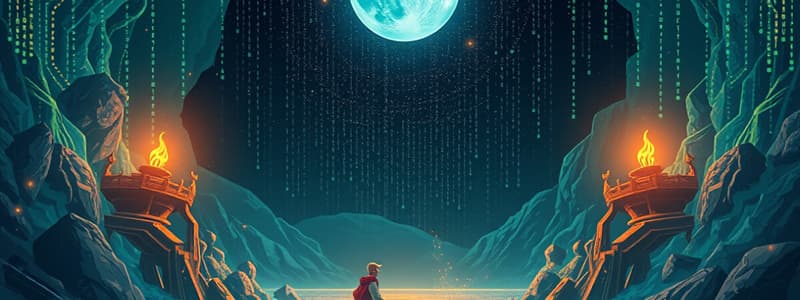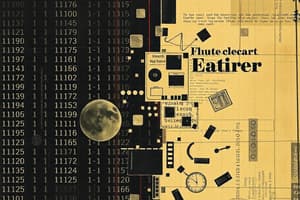Podcast
Questions and Answers
What is the value of one MegaByte in terms of bytes?
What is the value of one MegaByte in terms of bytes?
- 1 trillion bytes
- 1 million bytes (correct)
- 1 billion bytes
- 1 thousand bytes
Which of the following statements about Java programming is false?
Which of the following statements about Java programming is false?
- Java is designed for the internet.
- Java has a vast set of library packages.
- Java is not case-sensitive. (correct)
- Java is platform-independent.
What is the primary function of a compiler in programming?
What is the primary function of a compiler in programming?
- To test and debug code applications
- To format code for better readability
- To translate source code into machine code (correct)
- To execute source code directly
Which type of software development tool is typically more feature-rich and provides testing capabilities?
Which type of software development tool is typically more feature-rich and provides testing capabilities?
What distinguishes source code from machine code?
What distinguishes source code from machine code?
What is the role of the JVM in running Java applications?
What is the role of the JVM in running Java applications?
Which of the following statements about the main method in a Java application is true?
Which of the following statements about the main method in a Java application is true?
What is a characteristic of a class in Java?
What is a characteristic of a class in Java?
How should methods be named in Java?
How should methods be named in Java?
What distinguishes an object from a class in Java?
What distinguishes an object from a class in Java?
Flashcards are hidden until you start studying
Study Notes
Bytes & Bits
- 1 Byte = 8 bits
- 1 KiloByte (KB) = 1,000 bytes
- 1 MegaByte (MB) = 1,000,000 bytes
- 1 GigaByte (GB) = 1,000,000,000 bytes
- 1 TeraByte (TB) = 1,000,000,000,000 bytes
Java Programming Generalities
- Java is safe, portable, and platform-independent.
- Features a vast array of library packages for developers.
- Designed for internet applications and utilizes object-oriented programming principles.
- Follows a specific syntax; for example,
System.out.println("hello world");. - Case-sensitive, meaning uppercase and lowercase letters are treated differently.
Source Code
- Composed of instructions in a programming language directing computer operations.
- Structured to be human-readable with functions, definitions, and operational statements.
Types of Editors
- Text Editor (e.g., Notepad++) focuses primarily on code editing.
- Integrated Development Environment (IDE) like Visual Studio Code has advanced features for testing and previewing code.
- Prominent IDEs include IntelliJ, Eclipse, and Visual Studio Code as of 2024.
Compiler
- A compiler translates source code into machine code for execution by a computer.
- Class files contain bytecode and have a
.classextension, utilized by the Java Virtual Machine (JVM) for running Java applications.
Main Method
- Each Java application contains a class with a main method.
- The main method’s instructions execute when the application starts:
public static void main(String[] args) {...}. - This method is called automatically upon program execution.
Classes
- Classes are the foundational building blocks of Java, acting as blueprints defining object properties and behavior.
- Declared using the keyword "class" and must follow naming conventions, such as using uppercase for the first letter.
- Class body is enclosed in curly braces
{ }. - The public class name must match the file name; e.g.,
HelloPrintermust be inHelloPrinter.java. - Programs can have multiple classes, but only one can be public.
Methods
- Methods are sets of instructions designed to perform operations on data.
- They typically begin with a lowercase letter.
Objects
- Objects are instances of classes, representing actual components of programs.
- An object can call methods, e.g.,
System.out.println("Hello World");.
Variables
- Variables store values for future use and have types that must be specified when declared.
- Use meaningful names and start with a lowercase letter.
Types
- String: Text in double quotes
" ". - int: Integer values.
- float: Decimal numbers.
- char: Single character in single quotes
' '. - boolean: Represents true or false values.
- Arithmetic operators (+, -, *) can be used with these types.
Identifiers
- Identifiers are names for packages, classes, methods, or variables.
- Must start with a letter, underscore, or dollar sign; subsequent characters can include letters, numbers, or underscores.
- Cannot contain symbols like
?,%, or spaces, and must adhere to camel case convention. - They are case-sensitive and cannot consist of reserved words like "class."
Class vs Method vs Objects Example
- The class represents a skeleton with data and methods for data manipulation.
- Objects derived from the class provide different characteristics under the same attributes.
- Methods are instructions tied to the object, e.g., a method
write()directing an action. - Calls to methods vary by object, like
male.write()orfemale.write(), demonstrating method accessibility across different instances.
Studying That Suits You
Use AI to generate personalized quizzes and flashcards to suit your learning preferences.




